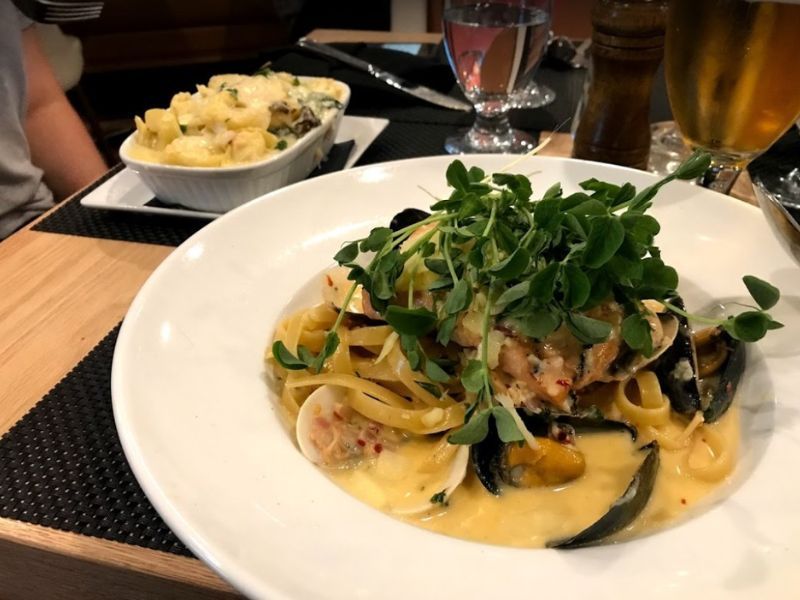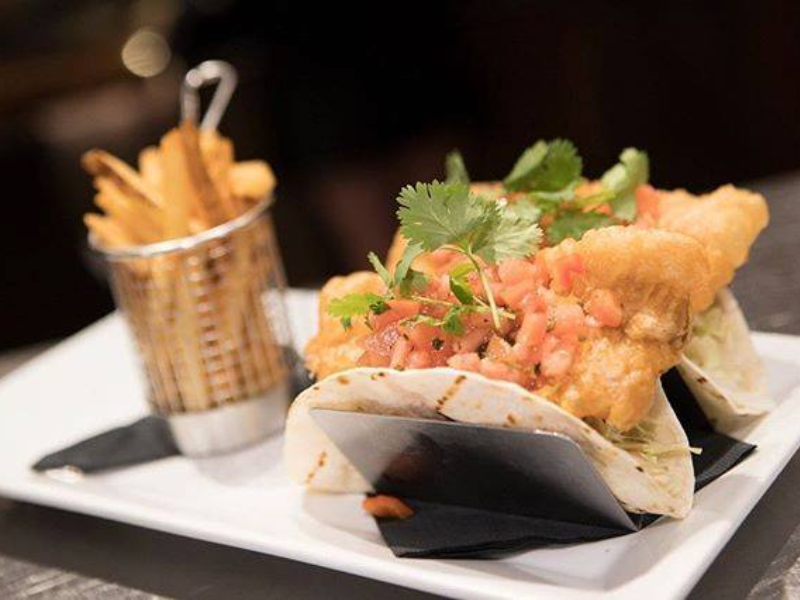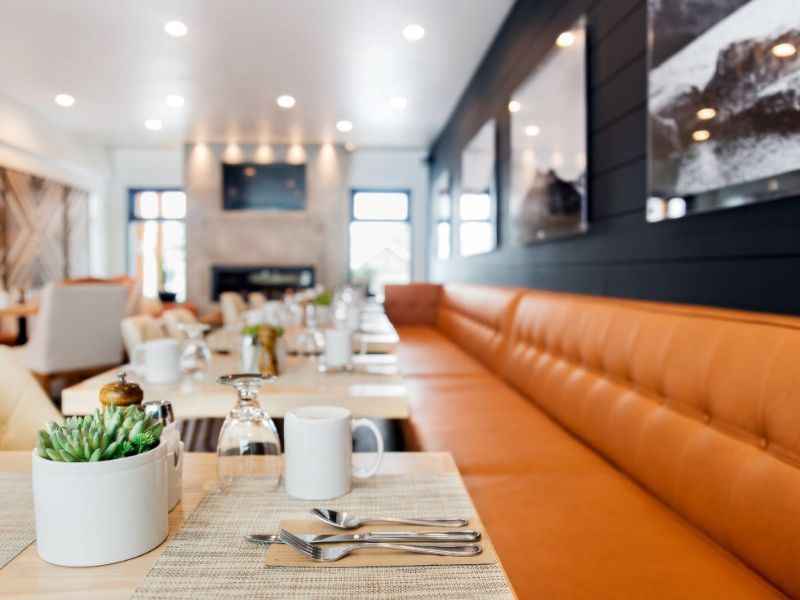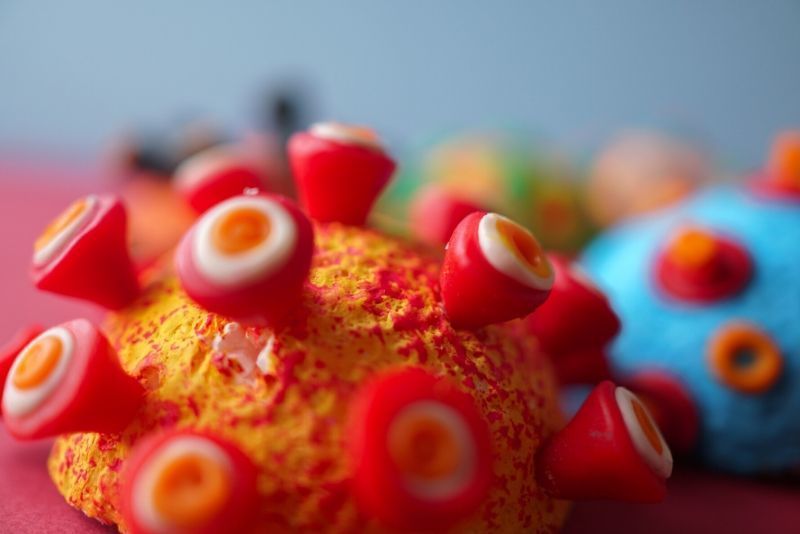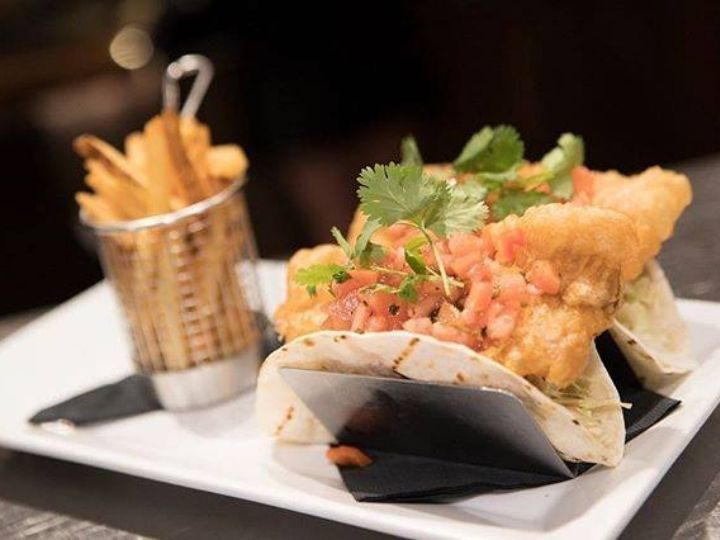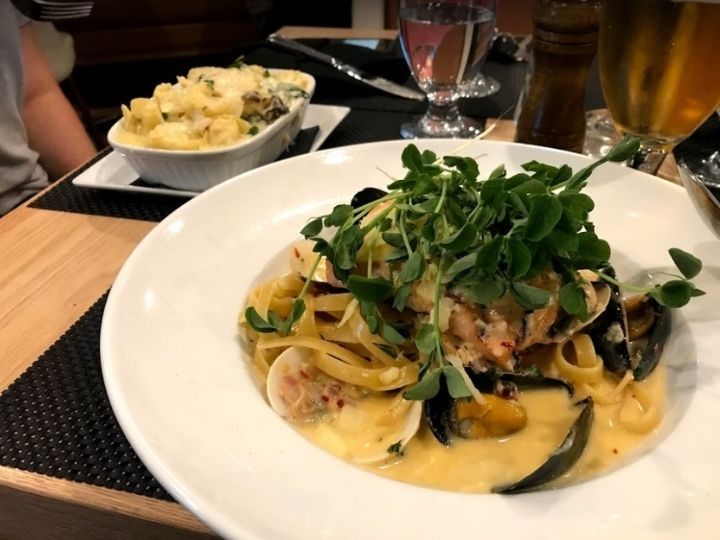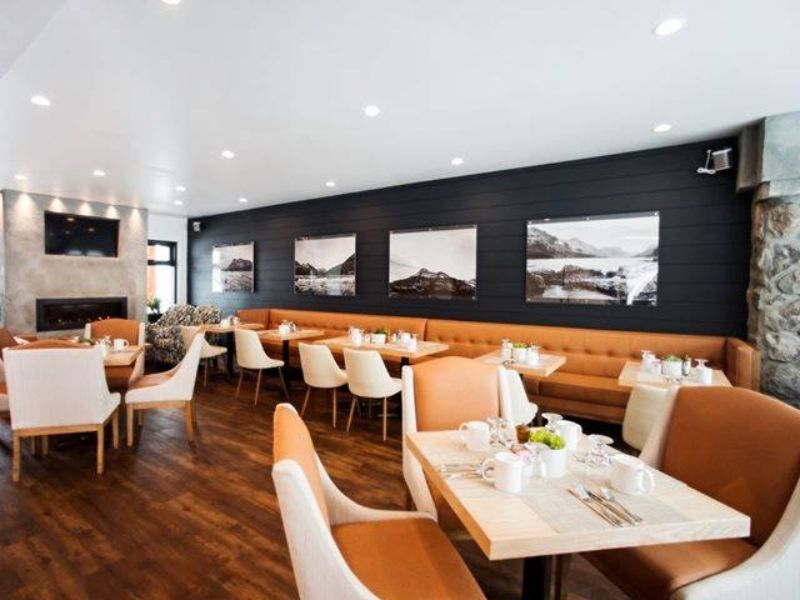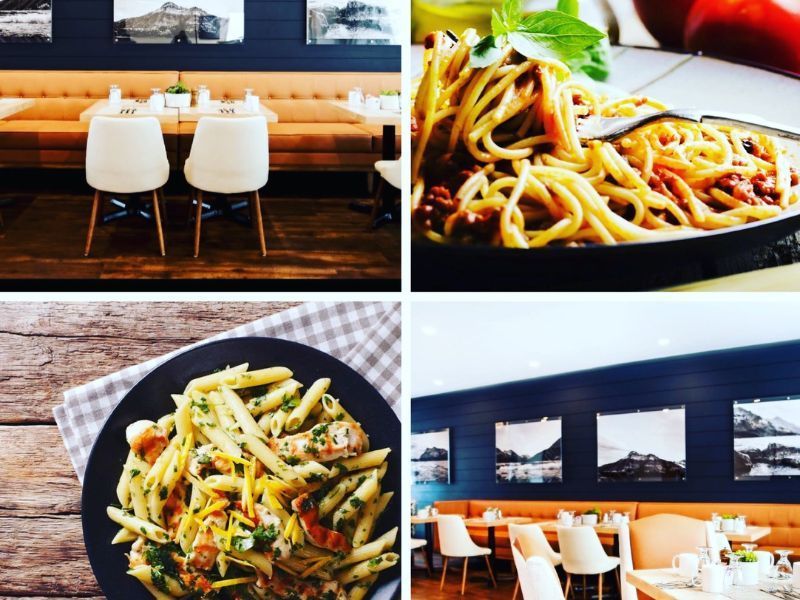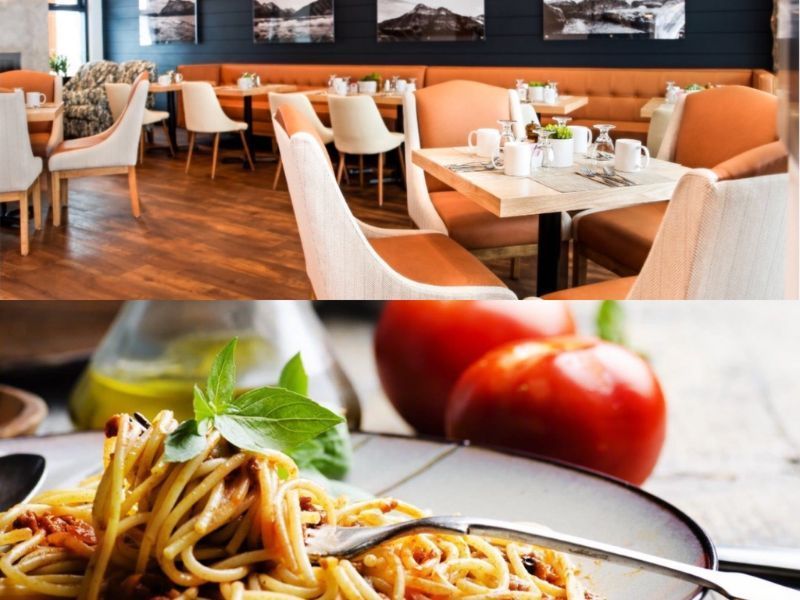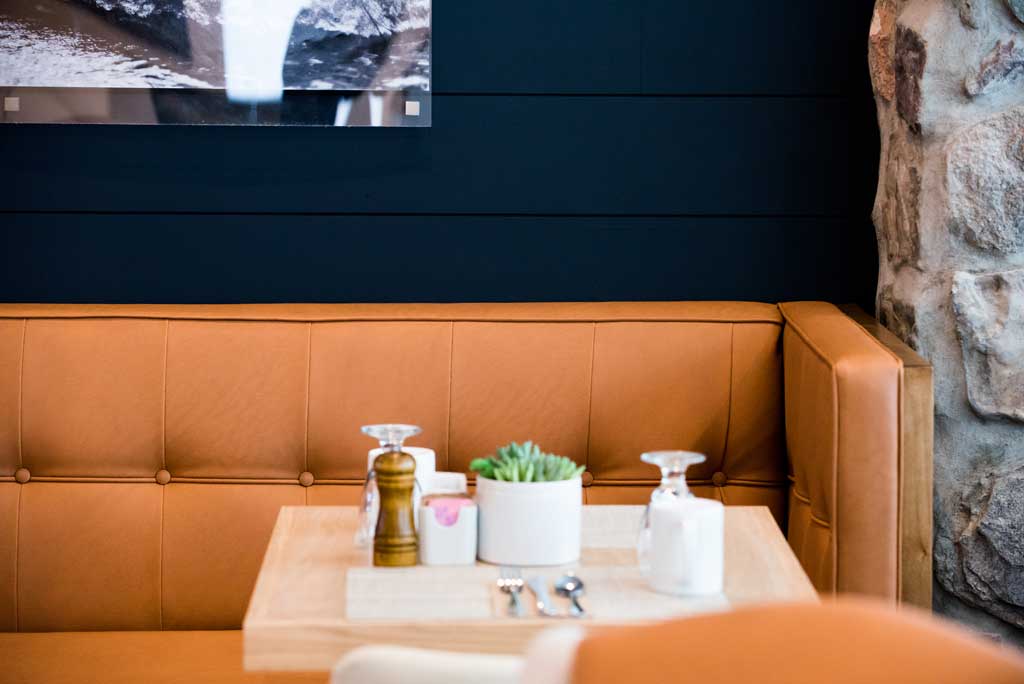Ultimate Craft Coffee Guide: Brew Like a Pro
Have you ever had a cup of coffee that just stopped you in your tracks? It's rich, complex, and tastes worlds away from that standard morning brew. You can absolutely discover how to brew and truly enjoy the incredible flavor of craft coffee right in your own kitchen.
You'll find that a great cup is more about passion and technique than fancy, expensive equipment. Making a better coffee brew at home is completely within your reach. Crafting this coffee guide took a long time. At Red Rock Trattoria, we learned everything from finding the best beans to brewing your morning drink.
We're going to walk through every step together, so you can feel that same pride and joy we feel every single day. Moving past a simple caffeine habit to genuinely appreciate coffee's nuances proves incredibly fulfilling. You start to notice the subtle notes of fruit or chocolate in your cup, and you learn that how you grind your beans can completely change the taste.
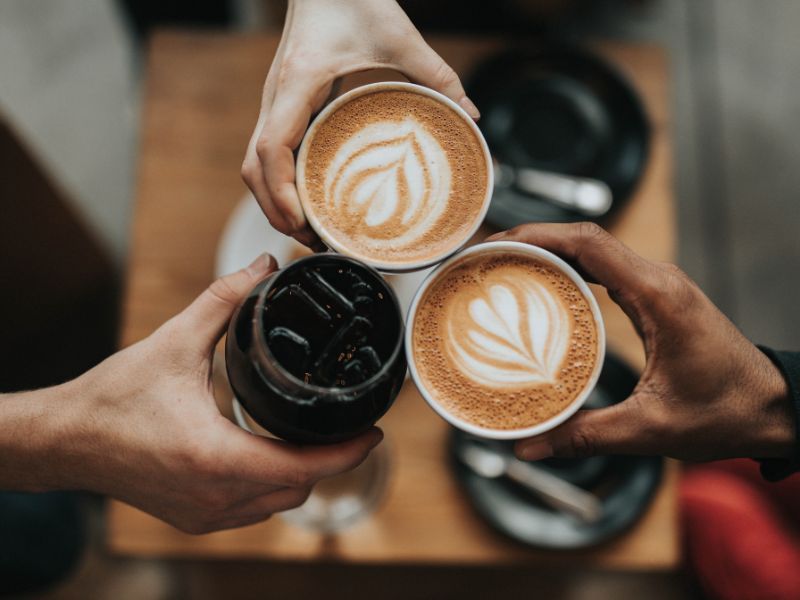
What Really Makes Coffee 'Craft'?
So, what's the big deal about "craft coffee"? It isn't just a label for a pricey drink. Imagine a perfect cup of coffee. It’s one made with real care, shared among friends, and leaves you with a lasting good feeling.
At its heart, craft coffee, often called specialty coffee, is about connection. You'll discover the farmer who nurtured the beans, the roaster who brought out their rich flavor, and the barista who poured your cup. Every cup whispers the coffee's history, from its distant farm to your table.
Our passion for fresh ingredients comes through clearly. You'll discover a vibrant, satisfying flavor in everything we make. This isn't about mass production, but rather careful attention at every stage. A reputable coffee company focuses on producing a consistently amazing product for coffee enthusiasts.
It All Starts with the Bean
You can't make great coffee with mediocre beans. The quality of your final cup is decided long before you ever start brewing. It begins in the high-altitude farms where coffee cherries are grown and harvested with care.
Sourcing Matters: Where Your Coffee Comes From
Building strong relationships with coffee producers is fundamental. We partner with farmers and co-ops who don't just grow things; they obsess over making sure every single item is top-notch, just like we do. We bring in the kind of incredible coffee beans you won't spot anywhere else.
You'll often see terms like "single-origin" and "blend" on bags when you buy coffee. Single-origin coffees come from one specific farm or region and highlight the unique flavors of that place. We pick these to really highlight a cool taste, think of the lively citrus kick you get from an Ethiopian Yirgacheffe coffee.
Blends, by contrast, mix beans from many places. This makes a consistent, full flavor. Think of a signature espresso blend, which is made to be delicious on its own or with milk. When you choose, remember that buying fair and tracking products back to their source is super important to us. It directly helps farmers earn a living and keeps our world healthy.
The Art of the Roast
Roasting is where a green coffee bean's potential is brought to life. A roaster's job is to apply heat in a way that develops the bean's natural sugars and acids into complex flavors. Getting it right means mixing cold facts with a creative touch. You won't learn it overnight; it takes real effort.
How dark coffee is roasted truly changes its flavor. A light roast will be higher in coffee acidity, with more floral and fruity notes that let the bean's origin shine. A dark roast is bolder, with notes of chocolate and nuts, as the roasting process itself imparts more of its own flavor.
We choose to roast in small batches right here in our coffee shop. We watch over each roast ourselves, making sure the coffee you brew is consistently top-notch. Imagine the difference truly fresh craft coffee beans make. The ones you get from us are always at their peak, bursting with incredible flavor.
The Grind: The Unsung Hero of Your Brew
You've got great, freshly roasted coffee. What's the subsequent action? The coffee grind. What seems like a minor detail actually packs a punch, drastically changing your coffee's flavor.
A consistent grind size is everything. A burr grinder is always a better choice than a blade grinder because it creates uniform particles. Blade grinders smash beans into uneven pieces, leading to a brew that can be both coffee bitter and weak at the same time.
A burr grinder, however, mills the beans between two revolving surfaces into a uniform size. This gives you much more control and a balanced extraction. If you want to improve your home coffee brewing, investing in a good burr grinder is the single best step you can take.
Every brewing style asks for a specific coffee grind. A coarse grind is perfect for a French press, while espresso needs a very fine, almost powder-like grind. Using the right setting to grind coffee for your method allows the water to extract the right amount of flavor from the grounds.
Using freshly ground coffee is paramount, so we always advise that you skip pre-ground coffee. While convenient, pre-ground coffee loses its aromatic compounds very quickly after being ground. Grinding just before you brew makes a world of difference; you can taste it.
A Brewer's Craft Coffee Guide to Perfect Extraction
Now we get to the fun part: the coffee brewing. Extraction is simply the process of using water to pull flavor out of the coffee grounds. Mastering it is about controlling variables like time, temperature, and water flow.
Mastering Espresso
A perfect shot of espresso is the foundation for so many classic coffee drinks. When we pull a shot from our espresso machines, we're looking for three things. We want a rich, reddish-brown crema on top, a full-bodied liquid, and a total shot time of around 25 to 30 seconds.
This trifecta tells us that the grind, dose, and temperature are all working together correctly. When it's right, the espresso is sweet, rich, and complex. Ever notice that small, dark pour? It's where all the big coffee taste lives, and it forms the starting point for nearly every drink in a café.
At home, a quality espresso maker can help you replicate this experience. Getting a great shot means putting in the time. Once you watch all the small details, you'll taste the difference. Don't be discouraged if your first few attempts aren't perfect.
The Pour-Over Ritual
The pour-over method is a beautiful, meditative way to brew coffee. As one of the most popular manual brewing styles, it gives you complete control over the process. It begins with the "bloom," a small pour of hot water that lets the coffee grounds release trapped carbon dioxide.
After the bloom, you pour the water in slow, steady circles, controlling the flow rate with a gooseneck kettle. The ideal water temperature is just off the boil, usually between 195 and 205 degrees Fahrenheit. This precision allows the delicate floral and fruit notes in lighter roasts to come through clearly, resulting in a clean and vibrant cup of coffee.
Smooth & Sweet: The Cold Brew Method
Cold brew is a different beast altogether. Instead of using heat, this coffee brew guide shows it uses time. Coarsely ground coffee is steeped in cold water for 12 to 24 hours.
This slow, gentle extraction results in a coffee concentrate that's incredibly smooth, low in acidity, and naturally sweet. It's perfect on a hot day or for those who find regularly brewed coffee too acidic. Its smooth character makes cold brew a very popular choice at any modern coffee shop.
What other ways will you brew your next cup?
Many coffee makers exist, each brewing a distinct cup. Your coffee maker really pulls out the best flavors from your beans. Here are some common ways people make coffee in their own kitchens.
- The French press is beloved for its simplicity and the full-bodied, robust coffee it produces. Because it uses a metal mesh filter, more oils and fine sediments make their way into the cup, creating a rich texture.
- You'll quickly see why the AeroPress is so popular; it's fast and flexible. Imagine brewing a perfect, strong coffee in just sixty seconds. Then, toss it in your bag – it's ready for any journey.
- A classic drip coffee maker is perfect for brewing larger batches. Look for one certified by the Specialty Coffee Association (SCA) to ensure it reaches the proper temperature for good extraction. This coffee maker makes a good, simple cup every day.
- You just put a Moka Pot on your stove, and it brews up a bold, rich coffee that's almost like a shot of espresso. It's easy on your wallet and a time-honored favorite for brewing coffee with real kick. Most brewing instructions point to this as a solid place to begin.
Discovering how each distinct brewing method alters flavor truly adds to the pleasure. You might find you prefer a French press in the morning and a pour-over in the afternoon. Having a few different coffee brew guides on hand can help you perfect your technique for each method.
The Finishing Touch: Milk and Flavor
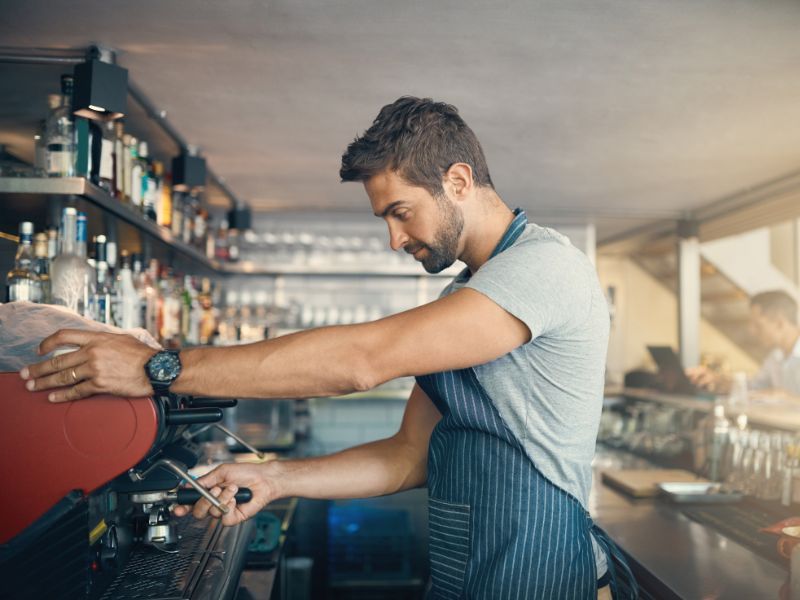
For many coffee drinkers, milk is a necessary partner to their daily brew. How it's prepared and chosen can either elevate a drink or hide the beautiful flavors of the coffee. Learning to steam milk properly is a skill that takes practice but is well worth the effort.
The goal is to create a velvety microfoam, not stiff, bubbly froth. You'll find this applies to regular dairy milk just as much as it does to plant-based options like oat or almond beverages. First, add air to the milk until it's warm. Then, sink the steam wand deeper to create a powerful swirl. This breaks down big bubbles, making the milk incredibly smooth.
Ever stopped to think about why coffee makers carefully swirl those beautiful designs into your drink? It's not just for looks. A well-poured design is a signature of skill, showing that the milk is perfectly steamed and integrated with the espresso, creating a harmonious taste of coffee in every sip.
Beyond the Basics: Signature Drinks and Pairings
Once you have the fundamentals down, you can start getting creative. Whipping up our own syrups brings us real joy. At Red Rock Trattoria, we gather fresh, local ingredients that are currently in season. A touch of lavender in the spring or spiced pumpkin in the fall can transform a simple latte into a special treat.
Finding the perfect food to go with our coffee is a fun challenge. We often find ourselves watching the Food Network, brainstorming tasty pairings from what we see. The right pairing can bring out hidden flavors in both the coffee and the food. Sipping coffee with a pastry that complements its taste truly sharpens your palate.
The bright acidity of a light roast, for example, cuts through the richness of a buttery citrus scone beautifully. On the other hand, the deep, chocolaty notes of a dark roast are a perfect match for a decadent brownie. Savory dishes can totally hit the spot, leaving you feeling completely content after a meal.
| Coffee Roast | Flavor Profile | Suggested Pairing Suggested Pairing |
|---|---|---|
| Light Roast | Bright, Floral, Citrusy | Fruit Danishes, Scones, Yogurt Parfait |
| Medium Roast | Balanced, Nutty, Caramel | Breakfast Sandwiches, Muffins, Apple Pie |
| Dark Roast | Bold, Chocolaty, Smoky | Chocolate Brownies, Biscotti, Tiramisu |
Your At-Home Coffee Toolkit
Bringing the craft coffee experience into your home is easier than you think. You don't need a professional espresso machine to make great coffee. To begin tasting coffee like a pro, gather some basic gear and pick up a few helpful habits.
Start by buying fresh, whole-bean coffee from your favorite online coffee seller or local roaster; many even offer free shipping. Store your beans correctly in an airtight container away from light, heat, and moisture. Grinding your beans just before you brew will make an incredible difference in the flavor of your drip coffee.
Consider your fluid intake. Coffee is over 98% water, so the quality of your water matters. Using filtered water is generally best, as minerals in tap water can impact flavor extraction. Use water just off the boil, and try to use a consistent coffee-to-water ratio; a good starting point is about 1 part coffee to 16 parts water.
If your coffee tastes bitter, you might be grinding too fine or brewing for too long. If it tastes weak or sour, try a finer grind or a longer brew time. Small adjustments can fix most common flavor issues; this is a common coffee skill for many beginners.
Furthering Your Coffee Education
If you want to continue learning, there are many great resources available. For an excellent look at brewing science and coffee culture, books from Jessica Easto and Andreas Willhoff are a great choice. Reading a good drink book can inspire new ideas and techniques.
Stopping by different coffee shops helps you really get to know a neighborhood. Talk to the baristas, ask about the latest coffee they're excited about, and try different coffee varieties. You'll often find yourself trying out fresh brewing styles and tasting different flavors this way.
Coffee with a Conscience: Sustainability in the Café
A true craft philosophy extends beyond the cup. This means we owe something to our neighbors. And to the planet itself. We actively choose to lessen our environmental mark, everywhere we can.
We give you a discount or a little bonus when you bring your own cup. We package all our takeout drinks in cups and lids that are compostable. Behind the counter, we grab gear that saves power and only clean with eco-friendly stuff.
Even coffee grounds don't go to waste. We partner with local community gardens and initiatives to make sure our used grounds are composted. This is a simple gesture to repay the soil and sun that grow the very beans and leaves for our comforting morning coffee and soothing afternoon tea.
A final summary.
You get delicious tastes, impressive brewing, and a real connection. It begins with responsibly sourced beans and continues through a precise roast, a consistent grind, and a thoughtful brew. Every part of the process lets you pour in a little thought, making a regular drink feel truly special.
Hopefully, this guide inspires you to pull out that French press you forgot about, or finally try that Ethiopian bean. Get brewing! Whether you're visiting a passionate local café or experimenting with a new brew method at home, remember that the perfect cup is about more than just the liquid. You might explore a pour-over, a French press, or even simple drip coffee; each has its own charm.
It’s really about the history, the friends gathered around, and the simple happiness of making something special, cup by cup. Curious about what we're cooking up next? Pop your email in below to get updates straight to your inbox. Get ready to experience our dedication to great coffee. We can't wait to connect with you over a cup.
